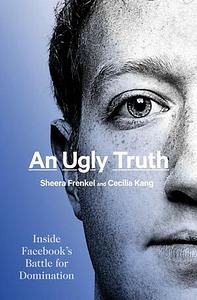Take a photo of a barcode or cover
I don’t know how to rate this book. It is depressing at times. While I don’t know Zuckerberg or Sandberg, I do believe, at times, they believed they were untouchable. The algorithms are spot on. Making groups to log in more, I am guilty. Allowing political figures to say what they want… I think Freedom of Speech crossed some lines. I commend those who came forward, and thank them for their courage and knowing something was wrong.
Interesting read about Facebook’s business choices at the expense of its users’ privacy and security.
challenging
dark
informative
tense
slow-paced
Really enjoyed this thoughtful and thorough account of all the harm Facebook has caused in the 2015-2020 time period alone. The authors do a fantastic job assembling a compelling narrative that clearly illustrates how the choices Facebook has made over and over prioritize profit over privacy, data security, and ultimately democracy. It's troubling. This book is well worth your time.
informative
medium-paced
challenging
dark
informative
reflective
medium-paced
This is a valuable compilation of relatively recent reporting on Facebook. It serves as a useful backgrounder for understanding the "Facebook files" published this past fall (after An Ugly Truth). However, it doesn't do a great job putting the events reported into context. I also don't trust the sourcing very much - like other NYT reporters, the authors rely on executive access and sources are often unnamed in the footnotes. Facebook (and social media generally) are among the most important stories of our era, this is a useful but, ultimately, unsatisfying account.
A negativity oriented reporting job on FB from the mid 2010’s to now. A surprisingly condemning view of Sheryl Sandberg and her enabling role in the recent fiascos FB has had.
Nothing particularly new on a conceptual level. FB incentivizes metrics at odds with the well being of its users. Time spent on the platform is the almighty North Star and that time can involve anything, from conspiracy theories to organizing militias. Facebook doesn’t care unless it results in negative PR.
The book itself is well written and well organized. There is an impressive level of access. As my friend Ross on here has said “it’s like trying to write about WW2 in 1944.” There’s still so much to be written.
As it stands. Interesting negative read. I’m not sure I’m walking away from this one significantly better informed beyond the increased conviction that FB is a serial “we’re sorry, we won’t do it again” violator.
Nothing particularly new on a conceptual level. FB incentivizes metrics at odds with the well being of its users. Time spent on the platform is the almighty North Star and that time can involve anything, from conspiracy theories to organizing militias. Facebook doesn’t care unless it results in negative PR.
The book itself is well written and well organized. There is an impressive level of access. As my friend Ross on here has said “it’s like trying to write about WW2 in 1944.” There’s still so much to be written.
As it stands. Interesting negative read. I’m not sure I’m walking away from this one significantly better informed beyond the increased conviction that FB is a serial “we’re sorry, we won’t do it again” violator.
3.5 rounded down to 3
In spite of the fact that An Ugly Truth... doesn't really add anything new to the table when it comes to Facebook practices and inner workings, S. Frenkel and C. Kang narrate the events in a compelling writing, which makes quite difficult to stop reading.
The book is not a compendium of different newspapers articles but rather a (mostly) comprehensive insight into Facebook's affairs. Still, in some chapters I'd say the book falls short when it comes to getting a broader opinion of lawmakers, both former and current.
Anyway, given the relevance of the different social, political and ethical issues Facebook has run into, I recommend reading this book. It's a fast-reading experience and the book is short.
In spite of the fact that An Ugly Truth... doesn't really add anything new to the table when it comes to Facebook practices and inner workings, S. Frenkel and C. Kang narrate the events in a compelling writing, which makes quite difficult to stop reading.
The book is not a compendium of different newspapers articles but rather a (mostly) comprehensive insight into Facebook's affairs. Still, in some chapters I'd say the book falls short when it comes to getting a broader opinion of lawmakers, both former and current.
Anyway, given the relevance of the different social, political and ethical issues Facebook has run into, I recommend reading this book. It's a fast-reading experience and the book is short.
informative
reflective
fast-paced




